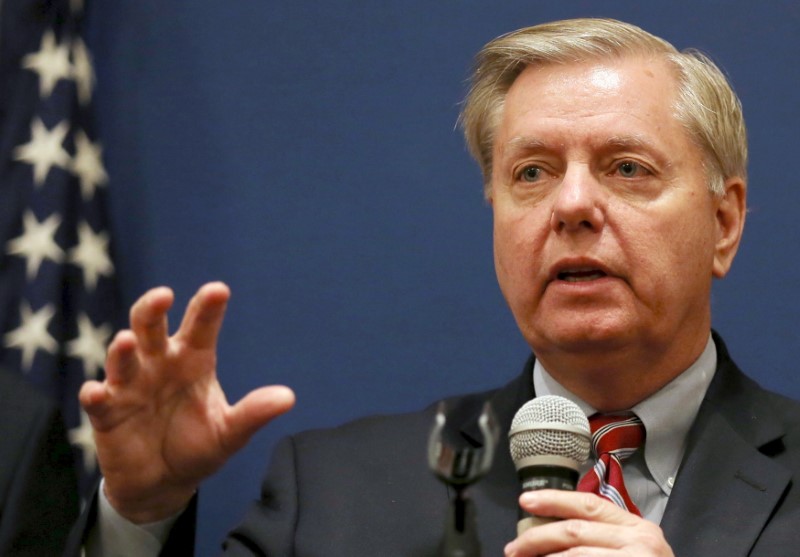By David Morgan and Sarah N. Lynch
WASHINGTON (Reuters) - U.S. Republican and Democratic senators called on Sunday for a special bipartisan panel to investigate cyber attacks against the United States by foreign countries with a focus on Russia's alleged efforts to influence the U.S. presidential election.
Charles Schumer, who will be Senate Democratic leader in the new U.S. Congress in January, and Republican John McCain, chairman of the Senate Armed Services Committee, said separately on Sunday a select committee was needed to ensure effective congressional focus on the hacking of Democratic Party emails during the campaign.
"The fact that they're hacking our political system and trying to influence the outcome, as it seems to be, that is serious, serious stuff," Schumer of New York told a news conference in New York. He said the panel should also examine hacking by other countries including China and Iran.
Two other senators, Republican Lindsey Graham of South Carolina and Democrat Jack Reed of Rhode Island, joined Schumer and McCain of Arizona in sending a letter to Senate Republican leader Mitch McConnell requesting the panel.
By having one dedicated committee on the subject, they said, the investigation could be targeted, while avoiding the jurisdictional overlap that would occur if multiple panels started conducting their own reviews.
"Recent reports of Russian interference in our election should alarm every American," they wrote.
"Cybersecurity is the ultimate cross-jurisdictional challenge, and we must take a comprehensive approach to meet this challenge effectively."
A spokesman for McConnell's office said on Sunday he would review the letter from the four lawmakers.
Last week, McConnell said he would support efforts to investigate Russian interference in the presidential election.
U.S. intelligence agencies have concluded that Russia tried to influence the Nov. 8 election by hacking individuals and institutions, including Democratic Party bodies.
The matter has angered Republican President-elect Donald Trump, who says he won the vote fairly.
Russian officials have denied accusations of interfering in the U.S. election.
The U.S. Electoral College is expected to officially vote on Monday for Trump as the country's next president. At meetings scheduled in every state and the District of Columbia, the institution's 538 electors, generally chosen by state parties, will cast official ballots for president and vice president.
Trump won a majority of Electoral College votes, while the popular vote went to Democrat Hillary Clinton.
'OPEN QUESTION'
U.S. President Barack Obama suggested on Friday that Russian President Vladimir Putin personally authorized the Democratic Party email hacks.
McCain told CNN's "State of the Union" program that the U.S. response to the Russian attacks had been "totally paralyzed" and said cyber warfare "is perhaps the only area where our adversaries have an advantage over us."
The Trump transition team did not respond to a request for comment.
John Podesta, Clinton's presidential campaign chairman, said on Sunday it was an "open question" whether Trump's advisers colluded with Russia to hack into Democratic Party emails to try to sway the election outcome.
Leaked emails had revealed details of paid speeches that Clinton gave to Wall Street, party infighting and comments from Clinton top aides who said they were shocked about the extent of her use of a private server to send emails while U.S. secretary of state.
The leaks led to embarrassing media coverage and prompted some party officials to resign.
Podesta said there was evidence that Trump associates had contact with a Russian intelligence official and the website WikiLeaks before U.S. intelligence agencies accused Russia of being behind computer attacks of Democratic emails, including Podesta's. He did not specify what the evidence was.
"It's very much unknown whether there was collusion. I think Russian diplomats have said post-election that they were talking to the Trump campaign," he told NBC's "Meet the Press" program.
"Not what Mr. Trump knew, but what did 'Trump Inc' know and when did they know it? Were they in touch with the Russians? I think those are still open questions," he added.
Trump's incoming White House chief of staff, Reince Priebus, rejected the notion that Trump or his associates were aware of and in touch with the Russians during the hack attack.

"Even this question is insane," Priebus told "Fox News Sunday." "Of course we don’t interface with the Russians.